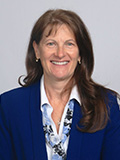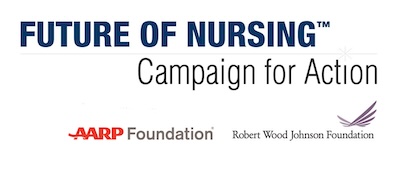Building the Infrastructure for Competency-Based Education in Nursing: A Step-by-Step Approach
April 22, 2025
2:00 PM - 3:00 PM (ET)
Webinar Details
Many nursing schools are working to implement the 2021 AACN Essentials in a competency-based framework. Sometimes the work may seem fragmented, leaving faculty unsure of the next steps. This presentation will share strategies for implementing a tactical and systematic approach to operationalize this work overtime and support schools in making incremental advances on their Essentials journey.
Outcomes:
- Review backward design for the implementation of competency-based education and assessment.
- Demonstrate the elements of a flexible timeline for building the infrastructure for competency-based education.
- Suggest approaches to address competencies needing greater representation across the curriculum.
- Provide examples of competency-based teaching and assessments faculty can implement in their programs.
Note: Recording of the webinar will be available soon after the webinar airs. Visit AACN's On-Demand Webinars to watch.
Speakers
Speakers

Gerry Altmiller, EdD, APRN, ACNS-BC, ANEF, FAAN
Professor Emeritus, Director
Quality and Safety Innovation Center
The College of New Jersey
Dr. Gerry Altmiller is a clinical nurse specialist for Jefferson Einstein Healthcare Network in Philadelphia, Pennsylvania and professor emeritus and director of the Quality and Safety Innovation Center at The College of New Jersey. She served on the QSEN Advisory board for over a decade and was a national consultant for integrating quality and safety into nursing curricula. Dr. Altmiller authored the Teamwork and Communication Module of the National Council of State Boards of Nursing’s Transition to Practice program and in 2014 she received a Lindback Award for distinguished teaching. For 7 years, she led the QSEN Academic Task Force, creating opportunities for its 120 faculty members to network, share ideas, and conduct academic-focused research. Her work on constructive feedback led to the development, testing, and dissemination of support tools for nurse educators and learning tools for students to view feedback as an opportunity. Dr. Altmiller is a member of the AACN workgroups that developed the toolkits to support adoption of the 2021 AACN Essentials, serves as a national consultant for schools of nursing working to integrate competency-based education, and has served on the editorial board for the Nurse Educator since 2017.
Tags
Navigating the Future Together: The Role of Academic-Practice Partnerships
April 15, 2025
2:00 PM - 3:00 PM (ET)
Webinar Details
This webinar will explore the value of academic-practice partnerships (APPs). Speakers from the AACN/AONL Academic-Practice Advisory Committee will discuss the importance of close collaboration between groups to implement the Essentials and move to competency-based education. The webinar will highlight the successful 17-year partnership between the University of Maryland School of Nursing (UMSON) and the University of Maryland Medical System (UMMS). The webinar will share practical insights that can be leveraged by academic and healthcare organizations to begin, expand, or sustain their own APP. This partnership will highlight lessons learned and future goals with implementation of APP related strategic initiatives focused on practice, academia, and research in alignment with the Essentials.
Outcomes:
By the end of this session, viewers will be able to:
- Attendees will be able to articulate the importance and benefits of academic-practice partnerships, particularly in enhancing nursing education, practice, and research.
- Attendees will gain practical insights into the origins, development, and sustainability of academic-practice partnerships.
- Attendees will learn about various collaborative, strategic initiatives to improve patient care, workforce challenges, academia, and research.
Note: Recording of the webinar will be available soon after the webinar airs. Visit AACN's On-Demand Webinars to watch.
Speakers
Speakers

Yolanda Ogbolu, PhD, FNAP, FAAN
Bill and Joanne Conway Dean and Professor
University of Maryland Baltimore School of Nursing
Yolanda Ogbolu is the Bill and Joanne Conway Dean and Professor at the University of Maryland Baltimore School of Nursing. Over the past 14 years at UMB, she has held various leadership roles, including Chair of Partnerships, Professional Education and Practice, Director of Global Health and Co-director of The Center for Health Equity and Outcomes Research and the Global Learning to Advance Health Equity Network. Ogbolu's research and scholarship at UMB have focused on advancing health equity and nurse capacity both locally and globally. Her projects focus on health equity, including improving culturally and linguistically appropriate care in hospitals, addressing social determinants of health, hypertension and social isolation in marginalized communities. She has secured over $17 million in funding from various agencies and foundations. Currently, she leads a national network to advance global learning for health equity under a grant from the Robert Wood Johnson Foundation and a community grant to reduce cardiovascular health disparities in Baltimore.

Karen Doyle, DNP, MBA, RN, NEA-BC, FAAN
Senior Vice President of Patient Care Services and Chief Nursing Officer
University of Maryland Medical Center
Karen Doyle is Senior Vice President of Patient Care Services and Chief Nursing Officer (CNO) at the University of Maryland Medical Center (UMMC). With more than 35 years of nursing experience, she has served in a variety of executive roles in care management, patient experience, trauma and emergency nursing, and women’s and surgical services. As CNO, Dr. Doyle helps oversee nursing practice, patient outcomes, and research at UMMC’s Downtown and Midtown cam puses. She was previously Senior Vice President of Nursing and Operations at the R Adams Cowley Shock Trauma Center, Maryland’s Primary Adult Resource Center, which serves more than 7,500 critically ill and severely injured patients annually. Dr. Doyle has been instrumental in the success of several key initiatives at UMMC, including the expansion of trauma, critical care, and emergency services; the relocation and building of a 250-bed acute care hospital; and the development of a surgery, obstetric, and gynecologic hospitalist program. She also led UMMC’s COVID-19 response and vaccine rollout. In 2024, UMMC earned its fourth consecutive Magnet designation under her leadership.

Peggy Norton-Rosko, DNP, RN, NEA-BC
Chief Nurse Executive
University of Maryland Medical System
Peggy Norton-Rosko serves as the University of Maryland Medical System’s leader for nursing practice, standards of care, nursing professional development and the partnership with schools of nursing. She also supports UMMS's strategic planning, nursing workforce development, continuous clinical improvement initiatives and the organization's High Reliability journey.Prior to her current role, Dr. Norton-Rosko served as the regional chief nursing officer for Trinity Health's Illinois and Indiana region. She has also served as the chief nursing officer for George Washington University Hospital in Washington, DC. Her clinical background includes many years as an advanced practice nurse working with cardiovascular surgery patients and also as a critical care nurse. She has served in affiliate and adjunct faculty positions for several schools of nursing. Dr. Norton-Rosko earned a BS in nursing from Northern Illinois University, a MS in nursing from Loyola University of Chicago and a DNP from Chamberlain University. She was named to the Johnson and Johnson Nurse Innovation Fellowship for 2023-2024. Dr. Norton-Rosko is committed to supporting a professional nursing practice environment that supports excellent patient care by advocating for nurses to engage in professional governance to shape their practice and improve patient outcomes.
Tags
Integrating the Essentials and Quality Improvement Using the Million Hearts Initiative (Part 1 of 2)
February 18, 2025
2:00 PM - 3:00 PM (ET)
Webinar Details
This webinar is designed to introduce nursing educators to the Centers for Disease Control and Prevention’s Million Hearts initiative. This session will explore how the initiative aligns with the AACN Essentials and competency-based education, highlighting opportunities for integration into nursing curricula. Attendees will learn about clinical applications, available resources for nursing professionals, and how colleges of nursing can incorporate these strategies. Additionally, the webinar will showcase the Million Hearts Fellowship educational modules, providing a comprehensive overview of this online learning tool.
Outcomes:
The learner will be able to:
- Describe the Million Hearts Initiative
- Understand ways to integrate the Nursing Essentials and Competency-Based Education with the Million Hearts initiative
- Discuss clinical application and resources for nursing and colleges of nursing
- Integrate the Million Hearts Fellowship into nursing curricula
Note: Recording of the webinar will be available soon after the webinar airs. Visit AACN's On-Demand Webinars to watch.
Speakers
Speakers

Kate Gawlik, DNP, APRN-CNP, FAAN, FNAP, FAANP
Associate Professor of Clinical Nursing
The Ohio State University
Dr. Kate Gawlik is an Associate Professor of Clinical Nursing, Director of Undergraduate Health and Wellness Academic Programming, and the Director of the Bachelor of Science in health and wellness program at The Ohio State University. She is a Family Nurse Practitioner and her areas of expertise are in wellness, cardiovascular prevention, parental burnout, and nursing education. She pioneered an online educational program, the Million Hearts Fellowship, for healthcare professionals that has resulted in the cardiovascular screening and education of over 110,000 people nationwide and has been embedded into nursing curricula across the U.S. This work has received four national awards, including most recently, the AACN’s Innovation in Professional Nursing Education Award. She is a Fellow of the American Association of Nurse Practitioners, the National Academies of Practice, and the American Academy of Nursing.

Bernadette Melnyk, PhD, APRN-CNP, FAAN, FAANP, FNAP
Professor and Dean Emeritus
The Ohio State University
Dr. Bernadette Melnyk is an inspirational speaker, author, leader, innovator, entrepreneur and recognized expert in evidence-based practice, mental health, population health and well-being, intervention research and organizational culture change. She also is CEO and founder of COPE2Thrive, LLC. For the past 13 years, she served as Vice President for Health Promotion and Chief Wellness Officer at The Ohio State University, where she also was the Helene Fuld Health Trust Professor of Evidence-based Practice . She founded the Helene Fuld Health Trust National Institute for Evidence-based Practice in Nursing and Healthc are. Dr. Melnyk is editor of eight books and has over 600 publications and received more than $36 million dollars of sponsored funding from N IH, AHRQ, and foundations as a principal investigator. She is an elected fellow of the American Academy of Nursing that has recognized her three times as an Edge Runner, the National Academy of Medicine, the National Academies of Practice, and the American Association of Nurse Practitioners. Dr. Melnyk has served on several national advisory boards, including the United States Preventive Services Task Force, and led nursing colleges at Ohio State University and Arizona State University. She is currently the elected chair of the National Forum for Heart Disease and Stroke Prevention and received honorary doctoral degrees from the State University of New York and Frontier Nursing University. Dr. Melnyk's COPE programs for depression and anxiety are used across 50 states and in several countries. She is editor-in-chief of Sigma’s top ranked journal Worldviews on Evidence-based Nursing and serves on the advisory board for the ANA’s Healthy Nurse Healthy Nation initiative.
Tags
Envisioning Students as Future Nurse Faculty
November 19, 2024
1:00 PM - 2:00 PM (ET)
Webinar Details
Discuss the importance of mentorship and the development of student to faculty pathways to encourage academia as a career choice.
Outcomes:
- Identify contributing factors to faculty shortage.
- Identify barriers for students/graduates to enter academia.
- Describe strategies to support students/graduate entry into academia.
Note: Recording of the webinar will be available soon after the webinar airs. Visit AACN's On-Demand Webinars to watch.
This webinar is co-sponsored by the Future of Nursing™ Campaign for Action, AARP Foundation, and the Robert Wood Johnson Foundation.

Speakers
Speakers & Facilitator
 Brigit Carter, PhD, RN, CCRN, FAAN
Brigit Carter, PhD, RN, CCRN, FAAN
Chief Access and Engagement Officer
American Association of Colleges
Dr. Brigit Carter, Chief Access and Engagement Officer, joined American Association of Colleges of Nursing (AACN) in February 2023. She is Professor Emerita at the Duke University School of Nursing, where she served as the Associate Dean for Diversity and Inclusion from 2018-2023. From 2015-2018 she served as the Director of the DUSON Accelerated Bachelor of Science in Nursing (ABSN) program. Dr. Carter earned her BSN at North Carolina Central University (NCCU) in 1998, a Master of Science in Nursing Education from University of North Carolina at Greensboro in 2002, and a PhD in Nursing from University of North Carolina at Chapel Hill in 2009. Her current educational research is focused on understanding students' experiences with microaggressions and the development of strategies to mitigate the impact of microaggressions. Dr. Carter also has a focus on strategies intended to increase historically marginalized students in nursing and understand individual-level social determinants that serve as barriers to achieving nursing education. Dr. Carter is a Fellow in the American Academy of Nursing, an Atlantic Fellow for Health Equity, and a Duke Teaching for Equity fellow.

Allison Lewinski, PhD, MPH, RN
Assistant Professor
Duke University School of Nursing
Dr. Allison Lewinski is a health services researcher with a focus on eHealth interventions and chronic illness self-management. Her work sits at the intersection of precision medicine and population health. Dr. Lewinski’s interest in health services and nursing research, specifically in developing and implementing sustainable interventions to improve health outcomes, is an extension of her experiences in public health and nursing. Dr. Lewinski aims to develop meaningful interventions that are relevant, appropriate, and can be implemented in real-world clinical settings with interdisciplinary collaborators. Her use of mixed methods enables her to understand how individuals engage with healthcare teams, how best to support behavior change in diverse populations and with varying disease states, and how to foster stronger engagement with the healthcare system. Additionally, Dr. Lewinski is interested in examining intervention implementation and adaptation as a means to understand how, why, when, and for what populations and settings interventions work. Dr. Lewinski’s career development award examines the association of diabetes distress and related factors using quantitative and qualitative methods in order to develop a novel, nurse-led intervention to improve self-management in Veterans with type 2 diabetes. Dr. Lewinski completed her postdoctoral fellowship in health services research at the Durham Center of Innovation to Accelerate Discovery and Practice Transformation at the Durham VA. She completed her PhD in Nursing at Duke University School of Nursing, a Master of Public Health in Health Behavior and Health Education at University of Michigan, a Bachelor of Science in Zoology at Michigan State University, and a Bachelor of Science in Nursing at Maryville University in St. Louis.

Winifred Quinn, PhD
Director, Nursing Workforce & Policy
AARP Center for Health Equity through Nursing
Dr. Winifred Quinn is the director, nursing workforce & policy, at the AARP Center for Health Equity through Nursing within the AARP Public Policy Institute (PPI). She co-leads a national campaign dedicated to improving health care through nursing, the Future of Nursing: Campaign for Action. She oversees a team that supports action coalitions in each state and the District of Columbia that work to implement the Institute of Medicine’s recommendations from its landmark 2011 report, The Future of Nursing: Leading Change, Advancing Health. Dr. Quinn also assists with the Campaign for Action’s diversity work to help ensure a more diverse nursing workforce, faculty, and leadership. Dr. Quinn also works across AARP to help address public policies that intersect with consumer and nursing issues. She focuses on policy issues related to improving funding for nursing education and legal barriers that pr event all levels of registered nurses from practicing to the full extent of their education and expertise. Her federal policy work includes working on nursing education provisions within the 2010 Patient Protection and Affordable Care Act. She helped to initiate a national-level coalition that successfully moved Medicare to begin supporting graduate-level nursing education. Her state-level policy work entails organizing technical assistance to action coalitions and AARP state offices that are improving funding for nursing education or modernizing the scope of practice laws. Within this role, she places a strong emphasis on building coalitions and engaging stakeholders. She holds a master's in counseling, higher education, and human development from Montclair State University and a PhD in communication processes with a focus on health and public policy from Rutgers University School of Communication and Information.
Tags
Infusing Artificial Intelligence in Undergraduate and Graduate Nursing Programs
November 05, 2024
2:00 PM - 3:00 PM (ET)
Webinar Details
The AACN Essentials suggest that nursing students across programs are to demonstrate competency with informatics. The current state of informatics suggests that one element is artificial intelligence (AI). Artificial intelligence has been infused into our daily lives. We and our patients wear or carry smartwatches and phones that calculate steps, monitoring for falls, heart rate, and oxygenation. Many of us and our patients have smart homes. These technologies are the result of taking very large data sets and creating models that can predict and alert us to events in our environment.
To begin the discussion, it is important to understand what AI is and what it isn’t. AI is computers simulating human thinking. AI is not human. Referring to the daily examples of AI in our daily lives, AI has also been infused into healthcare. In its most rudimentary form, clinical decision support was a pioneering example of AI. We now have access to generative text AI in the electronic health record to write notes and sophisticated models to guide decision-making. AI is not going away. So, we have a responsibility in nursing education to teach responsible use of this technology across programs.
Outcomes:
- Define AI.
- List examples of AI in daily life and healthcare.
- Describe how generative text AI works.
- Discuss ideas to infuse AI into nursing curriculum across programs.
Note: Recording of the webinar will be available soon after the webinar airs. Visit AACN's On-Demand Webinars to watch.
Speakers
Speakers

Rene Love, PhD, DNP, PMHNP-BC, FNAP, FAANP, FAAN
Associate Dean for Academic Affairs-Graduate Clinical Education
University of Florida College of Nursing
Dr. Rene Love is the Associate Dean for Academic Affairs for Graduate Clinical Education and a Clinical Professor at the University of Florida. She began her career in higher education in 1998 at Vanderbilt University School of Nursing. She has since held administrative roles in academia as a DNP Director (University of Arizona) and Psych Mental Health Specialty Coordinator (Vanderbilt University). She is certified as a psychiatric mental health nurse practitioner and specializes in trauma, substance abuse and borderline personality disorders.Dr. Love is an internationally recognized expert in advanced nursing practice education and leader in advancing Doctor of Nursing Practice (DNP) programs. Her leadership has influenced psychiatric mental health nursing and DNP education, practice, and policy. She has supported national organizations in developing training to support academic institutions in transitioning from BSN-MSN to BSN-DNP and is currently working on population-based competencies. Her contribution to nursing includes identifying educational inequities, developing innovative programs, and creating innovative resources for faculty to improve the quality of DNP education and healthcare delivery. Dr. Love is past president of the International Society of Psychiatric Mental Health Nursing and past board member at-large for the National Organization for Nurse Practitioner Faculty. Dr. Love graduated with her PhD from the University of Arizona (2015), her DNP (2010) and MSN (1998) from Vanderbilt, and her BSN (1985) from Valdosta State University. She is a Fellow in the National Academies of Practice, The American Association of Nurse Practitioners and the American Academy of Nursing.

Jane M. Carrington, PhD, RN, FAAN, FAMIA
Associate Professor, Dorothy M. Smith
Endowed Chair
Director Of Florida Blue Center For Healthcare Quality
University of Florida College of Nursing
Dr. Jane Carrington has taught informatics courses at the master's and PhD levels. Dr. Carrington has also taught Evidence Based Practice for DNP students. The focus of Dr. Carrington’s research is nurse to nurse communication of a clinical event or change in patient condition using the electronic health record. Dr. Carrington uses techniques in qualitative research and natural language processing to analyze nurse-to-nurse communication and decision-making associated with a clinical event. Dr. Carrington has been a long-time active member of the American Medical Informatics Association (AMIA) and Human Factors and Ergonomics Society. She is also a Fellow in the American Academy of Nursing and serves on the Information Technology Expert Panel. She has also served on national committees for issues related to informatics, informatics education and standards.